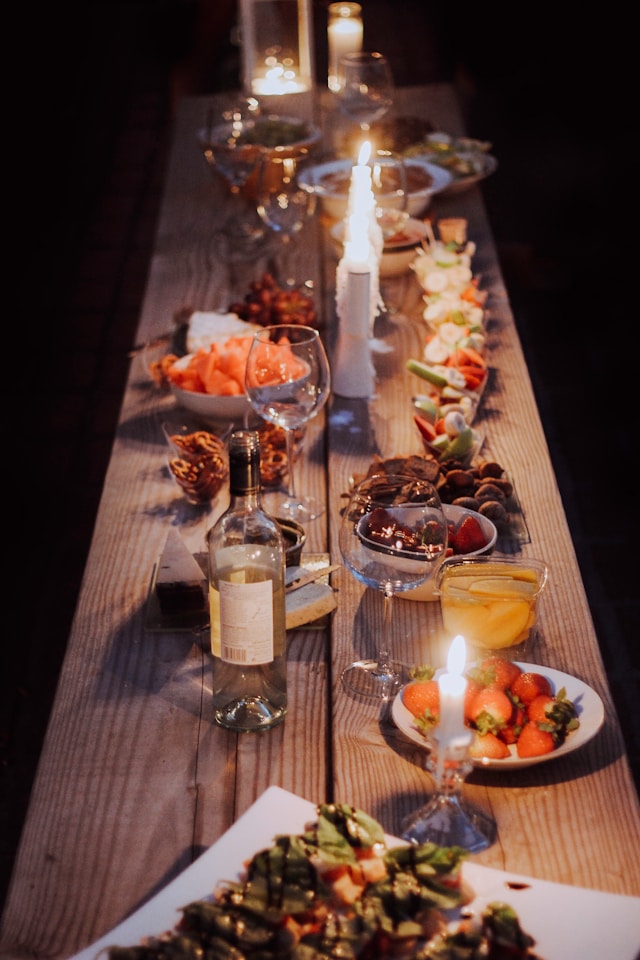
5 Ways to Consume (and Crown) a Weekend
- The preparations
My father wouldn’t eat for 24 hours prior to our monthly visits to Queens. Instead, he’d slowly suck his way through a roll of Butter Rum Life Savers and a bag of Starlight mints (typically needing at least thirteen) and justify the fast as a way to save room in his stomach for Friday night dinner. I still believe his explanation was nothing more than sweet talk for a cover-up, with the truth sticking somewhere between a way to save money for what the rest of the weekend would bring and the unfortunate reality his stomach couldn’t hold much other than breath during the routine pre-visit ritual prep. Our destination was Queens, yet our ship was captained by a ruling queen with little desire for anything other than a quick succession through the evening’s courses.
- The car ride
We’d pile into the family sedan as soon as school let out. We were warned that rest stops after Exit 13 were not an option. My father would push the gas pedal with varying degrees of intensity, knowing my mother would complain about his speed whether or not he drove in the passing lane. I’d track our progress by the city’s skyline and roadway signs for nearby tunnels. Before unpacking our bags at our NYC hotel, we’d visit relatives in a borough across another body of water for Friday night dinner. We took a bridge but even as a young child, I understood we weren’t bridging what divided us but simply fortifying the distance. We didn’t observe the Sabbath. In the small pockets of air where obligation kissed desire, placing the meal on the front end of the weekend ensured the mother ship would maintain its balance.
- The meal
Thirteen of us would huddle around a wood table too small for all of us and too large for the room it was in. A wheelchair took up one whole corner of the table. I’d sit on a stack of National Geographics and conspire, my wheels silently spinning. I didn’t know how to balance meatloaf, turkey, gravy, stuffing, green beans, and unnamed quiche without under-indulging or over-insulting. My intentions were selfishly driven. I wanted a slice of the strawberry cheesecake we brought from a bakery just outside the city. The square white box with a silver bow was neatly tied and placed in a glass armoire in between small figurines of rainbow-colored frogs, parrots, and dragons. The same armoire displayed my grandfather’s medals from a war he no longer remembered.
- The socialization
After dinner, we’d move to the 13th-floor apartment’s only other room and sit on Queen Anne hardback chairs while a parrot slept in a corner. The wind would knock and howl at the small terrace’s sliding glass door. “That’s high tide calling; it’s near time for cocktails on the deck,” someone would laugh. I’d hold my breath and pray the house of cards didn’t shatter. The U-shaped building was built after the war, and all its residents knew was fighting. We’d play games of Rummy and War (with a twist – Jacks beat Queens) using decks of cards that had lost an eight of hearts and a five of spades and were secured by red, yellow, and green elastic bands. I was curious about the images of reptiles on the back of each card but remained afraid to ask any questions. I can’t recall what the adults spoke of as they clinked ice in round glasses, but I remember not wanting them to stop.
- The hotel
Back at the hotel, an Omni with magnetic irony, we’d sleep fully dressed. A fire alarm at 3 AM years earlier modified the routine. My mother refused to be seen as anything other than how she wished her image to be – a Mona Lisa with a shimmery gold tiara. I’d count sheep and wonder what the building did with floor 13. In the lobby, a grand piano played complex tunes, all keys pre-programmed. A man dressed in a three-piece suit sat and listened. I’d count his attire – pants, jacket, vest, shirt, tie, not understanding the significance of the hotel’s number system. On Sunday, the lobby restaurant offered a champagne brunch. Patrons would consume buttered croissants and poached eggs in crystal mugs. A metal cart with tiny wheels would offer tiny cakes, pre-sliced and fully iced. I was served an oversized glass, my fingers cupped at its base, and taught to sip tomato juice over ice. Goblets were held high in parroted words and shatter-prone toasts to no one. I’d pretend I drank the blood of vermin, and my elders would pretend I belonged to somewhere and someone other than them.
- The alley
On the street outside the hotel lobby, a man would play Bach and Beethoven on a plastic organ for any queens, including the parrot on his shoulder, who’d listen. “If you don’t finish school, that could be you,” my father would warn. “Consider yourself lucky.” I never understood as even then, I knew that I was tone deaf, born with short fingers and uncoordinated reflexes, and a hesitation with the number thirteen. At the man’s feet, a small Chihuahua sat. It would parrot the man’s motions, as if it were a part of the act. Atop the organ the man placed a tall glass. I’d finger the cards in my pocket, count the coins like jellybeans, and wonder how he’d spend them.
I no longer recall their voices. I no longer recall their touch. Neither their scent nor much of anything else. I recall thinking if this is love, the war is won. My recollections reside in the small pockets of air (one, two, three, more) between new hands of cards and the intersecting (sometimes shuffling) worlds, constructed of glass, and their remarkable contrast. Not all houses home to dueling deuces are shatterproof.